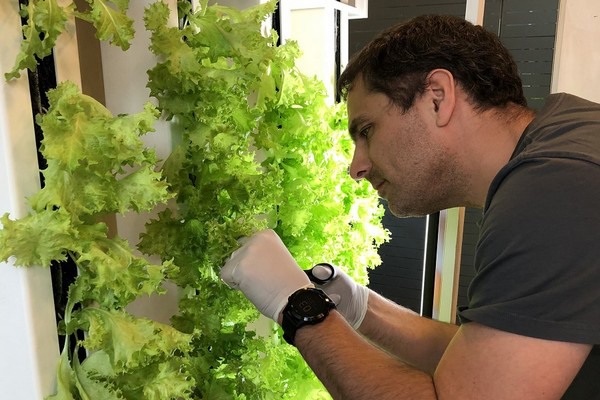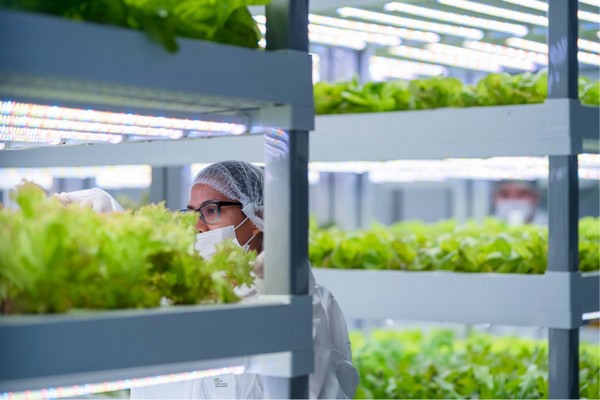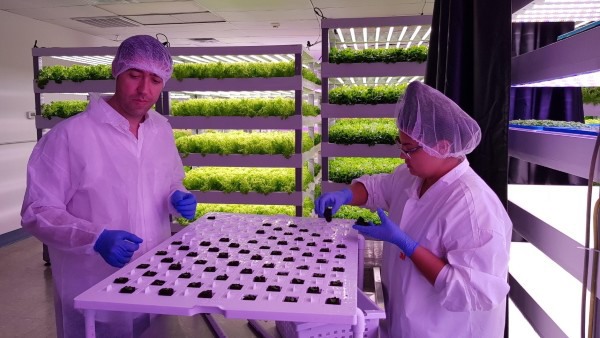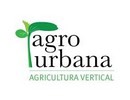As Chile has been in a complete lockdown since mid-May, AgroUrbana is lucky to continue its operations. “It’s not easy, because you have to change the way of operating, the interactions, and in-farm activities, even when food safety was already key to the company culture. Our customers have been ordering through home delivery”, Cristián Sjögren, Co-founder and CEO of AgroUrbana says.
Renewable energy
Bunster notes: “It took us from the energy market, from renewable energy, to farming. We believe that this is the perfect testing round to see what vertical farming can do.” Chile has drought, cheap labor, we have competitive, available and abundant renewables. Which is always a discussion around vertical farming. We manage sunlight here as we use 100% renewable energy PPA. However, we cannot do this with our pilot because the overall consumption is too low, so we have to regulate it. In our next farm, we will be able to go 100% renewable. That puts a lot toward sustainability for vertical farming.” The urban population is growing fast in Latin America. AgroUrbana believes that vertical farming can accommodate that food demand.
“Our next stage is, going commercial to a scale where we can bring costs down”, Bunster continues. “First, we thought of a small community distributed model with a few small blocks around, such as container farms. But, we believe that scale is still required as you can become more competitive with higher efficiency.
“First, we’re farmers and technology comes to serve that purpose be the best farmers! We are developing some technologies internally to run our farms, but our focus now is how we can actually rate the curve of cutting costs to make our products increasingly competitive. We want to stay out of the commodity but still reach the masses. Our mantra is to deliver better quality food to everyone”, Sjögren adds.

Pablo Bunster harvesting some fresh lettuce
Pilot farm
Sjögren states: “We started with a pilot farm, because vertical farming is something completely new in Latin America.” Before launching a new category for Agriculture in Chile, Sjögren and Bunster wanted to understand the economics of vertical farming. They took an approach of technology-agnostic by building a 3000 sq. ft pilot farm, where different technologies are tested. The 18-month pilot phase will be completed by the end of this year.
“We are integrating our own recipe that combines the seeds nature provides us with its nutrition and environmental parameters. Next to that, we are constantly improving and optimizing our operations in order to drive down costs”, Bunster adds. These quantities are allocated in a 3000 sq. ft farm which is not a large production, Sjögren noted, but this is done to test the market, integrate and develop our technology and do R&D in new varieties. AgroUrbana is planning on scaling up throughout Chile in 2021 with an aim to further expand into the new markets, mainly large urban areas, in the region in the next years.
“Chile is a perfect testing ground to start, test and stress what vertical farming can do, due to the Mediterranean weather we have, favorable to open farming, but also abundant and competitive renewable energy. We both spent our last ten years in the wind- and solar energy industry. Renewables will help AgroUrbana close the gap between traditional agriculture and vertical farming”, Sjögren says.
The country has suffered from climate change, with a 10-year drought that highly affected Chilean agriculture. AgroUrbana has achieved surprising improvements in its yield. “We are planning to transfer all this knowledge to our next farm, a 30,000 sq. ft commercial-scale farm. In the upcoming months, we are doing funding rounds in order to help us realize this farm.
Sjögren says that AgroUrbana is going to pilot in the berry space as well, such as strawberries. “We are starting a pilot to test the different varieties of strawberries. Next to that, we are developing edible flowers and some microgreens”, Sjögren affirms. Most of the volume is lettuce, but we will be rolling out other leafy greens and we will see how it goes with the other crops.

Carmelo platform
“There are many components such as climate control, irrigation, growing structures, and so on. We want to put all the pieces together and operate these very efficiently”, Sjögren states. The company is developing a technology ‘Carmelo’, a platform of sensors with hardware and software to monitor and control our operations. “We are at a level of precision, where we are able to handle the microclimates within the farm. Using Carmelo, we are collecting data already for over one year which is helping us to become even more precise and consistent.” All data gathered will be used for our first large scale commercial farm planned for 2021.
“We’re all about technology and data because that’s how you drive down the costs. We are combining genetics, giving the perfect climate, and the perfect environment. Carmelo is all about finetuning the recipe we’re creating, through managing a farm, and having consistent quality food, every day of the year”, Bunster adds.
Product pricing
“Our team is in good spirits as we have been keeping up production. The pandemic hit us hard, but we were able to relocate all production to different distribution channels, such as e-commerce, supermarkets and subscriptions”, Bunster states. We were planning on doing that already, but we accelerated our go-to-market because of the current situation. “There’s no going back on e-commerce because customers are getting used to it. If we can take our produce to e-commerce, keep our customers satisfied and easy about always getting the perfect product, they’ll always order it online. It’s something we already wanted to do and we are currently testing and proving it. So far, we’re doing okay”, Bunster adds.
AgroUrbana has two markets, one of them being retail with a fast pace opening of new distribution for their products, with 100% recyclable packaging. Furthermore, the company delivers its products to restaurants. Since one year, AgroUrbana has launched its own house mix of lettuce.

Cristián Sjögren and his colleague preparing the plugs for planting
Bunster mentioned that AgroUrbana is selling to restaurants that are price sensitive. Meaning that they care about food quality and the costs. “Here’s where food waste comes into play. We do not have any food waste. We’re coming to the point where most of what we grow, we’re able to process and sell. In restaurants only, we’re saving between 25-35% food of waste in leafy greens. We are very efficient in logistics as we don’t truck. We move food for a few miles from our farms to the kitchens of different clients. This helps us to make numbers for a competitive market.”
Focusing on the next generation
“It has been exciting to put our team together because nobody has a vertical farming degree on its resumé. We’re really excited to prepare the next generation of vertical farmers. We’re putting together different skills and attracting the next generation of farmers that want to move from the countryside to the city. It’s an attractive way to get a generation back to growing veggies in the city with a lot of interaction with technology”, Sjögren ends.

For more information:
AgroUrbana
Cristián Sjögren, Co-Founder and CEO
cristian.sjogren@agrourbana.ag
Pablo Bunster, Co-Founder and CCO
pablo.bunster@agrourbana.ag
www.agrourbana.ag
